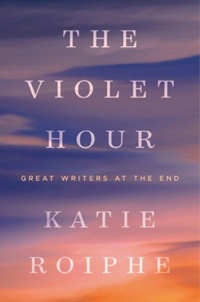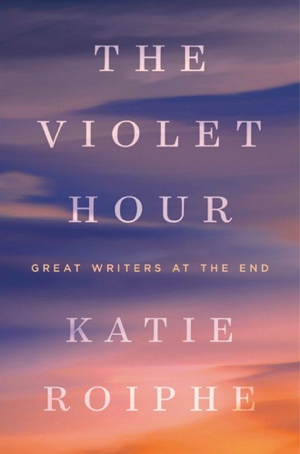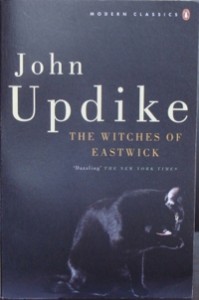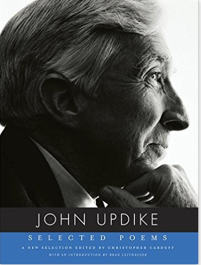 John Updike once told an interviewer, “I began as a writer of light verse, and have tried to carry over into my serious or lyric verse something of the strictness and liveliness of the lesser form.” A man of few regrets, Updike also remarked that he wished he were taken more seriously as a poet. His Selected Poems, edited by Christopher Carduff and published earlier this week, ought to go a long way toward reinforcing that.
John Updike once told an interviewer, “I began as a writer of light verse, and have tried to carry over into my serious or lyric verse something of the strictness and liveliness of the lesser form.” A man of few regrets, Updike also remarked that he wished he were taken more seriously as a poet. His Selected Poems, edited by Christopher Carduff and published earlier this week, ought to go a long way toward reinforcing that.
When Knopf published 300+ poems in Collected Poems, 1953-1993, it reinforced quite another thing: that Updike wrote a LOT, and that some poems were more successful than others. But winnowing those poems in order to present 132 of the very best highlights Updike’s considerable strengths as a poet.
Carduff has done a fine job editing the volume, eliminating light verse and selecting a range of Updike’s poetry that he ordered according to dates of completion, with the first poem being one that Updike wrote in 1953 at age 21—a poem that son Michael would later chisel on the back of Updike’s grave marker. The last was composed in 2008 at age 76. In that poem, written after Updike knew he had little time left in this world, Updike contemplates religion one last time and ends with a quote from Psalm 23: “Surely—magnificent, that ‘surely— / goodness and mercy shall follow me all / the days of my life, my life, forever.” The enjambment, of course, puts emphasis on “the days of my life . . . forever,” so that Updike’s last line reads like both an epitaph and a reaffirmation of the faith—whether certain or wavering—that informed much of Updike’s writing.
The longest poem in the collection is one that Updike scholars consider most important—Updike’s assessment at the “Midpoint” of his life—and that’s balanced by the inclusion of the poems that were published under the title “Endpoint.” The shortest is “Boil,” a mere six lines: “In the night the white skin / cries aloud to be broken, / but finds itself a cruel prison; / so it is with reason, / which holds the terror in, / undoubted though the infection.”
MacArthur- and Guggenheim-winning poet Brad Leithauser wrote in his introductory essay, “I’m tempted to call what [Updike] does naked poetry, not least because he so often focused on erotic and bodily functions. . . . But the poems are naked in a broader sense. They typically come to us unmediated through any fictional presence. You feel that it’s Updike himself (or perhaps John himself, since the poems foster, even between strangers, a companionable familiarity) who is addressing you. . . . Others have the apportioned stiffness of a studio portrait. But in the aggregate the poems present an album of himself more accurate and intimate and multifaceted than any similar-sized collection of his prose.”
“Naked poetry,” let’s call it, is only one type that is included in this volume, and those poems do stand out because there are no other big-name poets working in the English language who write raw or ribald but nonetheless accomplished poems about “The Beautiful Bowel Movement,” “Elderly Sex,” or “Two Cunts in Paris.” With all the lyric marvel of Amy Lowell’s “Sea Shell” or Oliver Wendell Holmes’ “The Chambered Nautilus,” Updike looks down into the toilet and can’t help but comment on “a flawless coil, / unbroken, in the bowl, as if a potter / who worked in this most frail, least grateful clay / had set himself to shape a topaz vase. / O spiral perfection, not seashell nor / stardust, how can I keep you? With this poem.” One suspects that Updike is caught, like many of his characters, in a dialectic—in this case, between writing a serious lyric poem and penning a wry and sophisticated parody of such poems, as if the challenge to write a lyric about something so base was too tempting to forego, but also a little outrageous. But the poem also anticipates the last line in this collection by affirming Updike’s conviction that immortality, or at least the illusion of it, is achieved through not only belief but also through writing.
There are a number of “naked” poems, in this volume, but there are also a number of ekphrastic poems (“Calder’s Hands”), nostalgic poems (“Dutch Cleanser,” “My Mother at Her Desk”), formal verse (“Spanish Sonnets,” “Airport,” “Oxford, Thirty Years After”), personal poems and tributes (“To Ed Sissman,” “Elegy for a Real Golfer”), lyric poems (“Saguaros,” “Chicory”), literary poems (“Marching through a Novel,” “Big Bard”), and narrative poem (“Leaving Church Early,” “Crab Crack”). There are also a good many travel poems (“Poisoned in Nassau,” “Heading for Nandi”) inspired by Updike’s adventures, which make it into verse more often than in his prose.
Topically, Updike covers just as much ground. Included are poems about sports, music, art, food, nature, and descriptions of ordinary activities that underscore Updike’s aesthetic credo that all of life is worthy of documenting in literature and that “culture” includes all human activity. Collectively these are powerful poems, and many of them—like “Dog’s Death”—resonate emotionally long after they’re read. Yet such poems are also highly formal, employing carefully considered stanzas and such poetic devices as slant rhyme.
Poems such as “Dog’s Death” stand up against the best written by contemporary authors, and Selected Poems is rich with similarly powerful poems. The nakedness might stand out, but there are carefully constructed skeletons here too, and a use of language that rivals Updike’s fiction for its judiciousness. Even when the poems begin in a highly prosaic manner, as happens with “Crab Crack,” Updike’s poetic language still asserts itself, gilding philosophical musings that are as much a part of his poetry as his frank, raw, and highly personal sharings:
“Now they are done, red. Cracking / their preposterous backs, we cannot bear / to touch the tender fossils of their mouths / and marvel at the beauty of the gills, / the sweetness of the swimmerets. All is exposed, / an intricate toy. Life spins such miracles / by multiples of millions, yet our hearts / never quite harden, never quite cease / to look for the hand of mercy in / such workmanship. If when we die we’re dead, / then the world is ours like gaudy grain / to be reaped while we’re here, without guilt. / If not, then an ominous duty to feel / with the mite and the dragon is ours, / and a burden in being.”
Collected and compressed, this volume offers proof that Updike is in fact a gifted poet whose verse should not be ignored. He displays a poetic range that would be impressive even had it come from an award-winning poet like Leithauser. John Updike’s Selected Poems is 320 pages and cloth bound, with notes on each poem detailing completion date, publication history, and relevant annotations (“Dog’s Death” includes the name of the dog and a remark from Updike about pet deaths). The suggested retail price is $30, but it’s selling for $18.51 at Amazon.
—James Plath
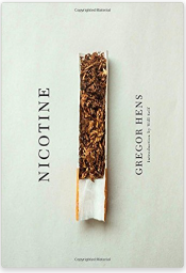 A book review of Gregor Hens’s Nicotine written for The Atlantic begins,
A book review of Gregor Hens’s Nicotine written for The Atlantic begins,

